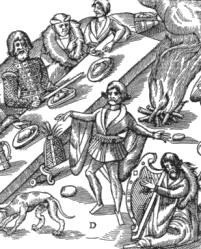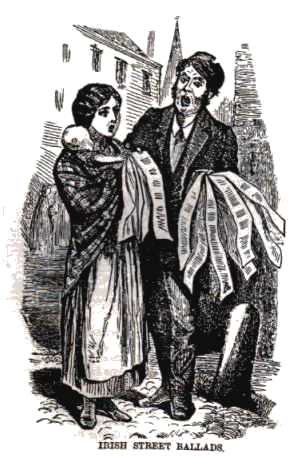Skellig List - On the Great Skellig rock in the
Atlantic, off the coast of Kerry, are the ruins of a monastery, to which people at one
time went on pilgrimage. The tradition is still kept
up in some places; in connection with the custom that marriages are
not solemnised in Lent, i.e. after Shrove Tuesday. Young persons who should have been married before Ash-Wednesday,
but were not, were supposed to set out on pilgrimage to Skellig on Shrove Tuesday night. It was usual for a local bard to compose what was called a
`Skellig List' - a jocose rhyming catalogue of the unmarried men and women of the
neighbourhood who went on the sorrowful journey. Some of these were witty and amusing: but occasionally they were
scurrilous and offensive doggerel.
Poor Andy Callaghan with doleful nose
Came up and told his tale of many woes:-
Some lucky thief from him his sweetheart stole,
Which left a weight of grief upon his soul:
With flowing tears he sat upon the grass,
And roared sonorous like a braying ass.
Aroon; a term of endearment, my love, my dear:
Eileen Aroon,
the name of a celebrated Irish air
[-> FW#21]:
vocative of Irish rún (roon), a secret, a secret treasure.
Cooleen or coulin; a fair-haired girl. This is the name of a
celebrated Irish air
[-> FW#21]. From cúl the back (of the head), and fionn, white or
fair:- cúil-fhionn, (pron. cooleen or coolin).
Cruiskeen; a little cruise for holding liquor. The Cruiskeen Laun is the name of a well-known Irish
air - the Scotch call it
`John Anderson my Jo'
[-> FW#21].
Irish cruiscín, a pitcher: lán (laun), full: i.e. in
this case full of pottheen.
Bowraun; a sieve-shaped vessel for
holding or measuring out corn, with the flat bottom made of dried sheepskin stretched
tight; sometimes used as a rude tambourine, from which it gets the name bowraun; Irish
bodhur (pron. bower here), deaf, from the bothered or indistinct sound.
Bother; merely the Irish word bodhar, deaf,
used both as a noun and a verb in English (in the sense of deafening, annoying, troubling,
perplexing, teasing): a person deaf or partially deaf is said to be bothered. It was first brought into use by Irishmen, such
as Sheridan, Swift and Sterne. In its primary sense of deaf or to deafen, bother
is used in the oldest Irish documents: thus in the Book of Leinster we have:- Ro
bodrais sind oc imradud do maic, `You have made us deaf (you have bothered us)
talking about your son': and a similar expression is in use at the present
day in the very common phrase `don't bother me' (don't deafen me, don't annoy me).
Jokawn; an oaten stem cut off above the joint, with a tongue cut
in it, which sounds a rude kind of music when blown by the mouth. Irish geoc n.
Leprachaun; a sort of fairy, called by several
names in different parts of Ireland:- luricaun, cluricaun, lurragadaun, loghryman,
luprachaun. Irish luchorp n,
from lu, little, and corp n, the dim. of corp, a body:- `weeny
little body.' The leprachaun is a very tricky little fellow. If you catch him and hold him, he will show you where treasure is hid, or give you a purse in which you will always
find money. But if you once take your eyes off him, he is gone in an instant.
I never heard of any man who succeeded in
getting treasure from him, except one, a lucky young fellow named MacCarthy, who,
according to the peasantry, built the castle of Carrigadrohid near Macroom in Cork with the money.
In a shady nook one moonlight night,
a leprachaun I spied;
With scarlet cap and coat of green;
a cruiskeen by his side.
'Twas tick tack tick, his hammer went,
upon a weeny shoe;
And I laughed to think of a purse of gold:
but the fairy was laughing too.
With tip-toe step and beating heart,
quite softly I drew nigh:
There was mischief in his merry face;
a twinkle in his eye.
He hammered and sang with tiny voice,
and drank his mountain dew:
And I laughed to think he was caught at last:
but the fairy was laughing too.
As quick as thought I seized the elf;
`Your fairy purse!' I cried;
`The purse!' he said - `tis in her hand -
that lady at your side!'
I turned to look: the elf was off!
Then what was I to do?
O, I laughed to think what a fool I'd been;
and the fairy was laughing too.
Elegant. This word is used among us, not in its proper sense,
but to designate anything good or excellent of its kind:- `That's an elegant pig of yours, Jack?' Our milkman once offered me a present for my
garden - `An elegant load of dung.'
I haven't the janius for work,
for 'twas never the gift of the Bradys;
But I'd make a most elegant Turk,
for I'm fond of tobacco and ladies.
 (1827-1914) in Glenosheen, Co. Limerick. Patrick's father Garrett, nicknamed
`the Scholar,' was a skilled musician; his brother
Robert Dwyer Joyce
(1830-83) contributed many tunes for
`The Petrie Collection of Ancient Music'
(1855), and - being a committed Fenian - wrote a number of patriotic ballads,
namely
`The Wind that Shakes the Barley'
(-> FW#7,
FW#13,
FW#21) and
`The Boys of Wexford'
(-> FW#7,
FW#21).
P.W. Joyce himself was a music collector too, best remembered for his
`Old Irish Folk Music and Songs' (1909).
He published works on Irish history and folklore as well, always aware of Irish
music, song and dance, even while being concerned with the dialect of the English
language that is spoken in Ireland, for `Irish music is the most beautiful
folk music in the world.'
(1827-1914) in Glenosheen, Co. Limerick. Patrick's father Garrett, nicknamed
`the Scholar,' was a skilled musician; his brother
Robert Dwyer Joyce
(1830-83) contributed many tunes for
`The Petrie Collection of Ancient Music'
(1855), and - being a committed Fenian - wrote a number of patriotic ballads,
namely
`The Wind that Shakes the Barley'
(-> FW#7,
FW#13,
FW#21) and
`The Boys of Wexford'
(-> FW#7,
FW#21).
P.W. Joyce himself was a music collector too, best remembered for his
`Old Irish Folk Music and Songs' (1909).
He published works on Irish history and folklore as well, always aware of Irish
music, song and dance, even while being concerned with the dialect of the English
language that is spoken in Ireland, for `Irish music is the most beautiful
folk music in the world.'
 common in old Irish poetry, and a bad practice it was; for many a good poem
is quite spoiled by the constant and wearisome recurrence of these
chevilles. For instance here is a translation of a couple of verses from
`
common in old Irish poetry, and a bad practice it was; for many a good poem
is quite spoiled by the constant and wearisome recurrence of these
chevilles. For instance here is a translation of a couple of verses from
` (i.e. would have floated). There is a tendency to put o at the end of some words, such as boy-o, lad-o.
(i.e. would have floated). There is a tendency to put o at the end of some words, such as boy-o, lad-o.
 these athletic fellows dancing on the bare boards with their thick-soled
well-nailed heavy shoes - so as to shake the whole house.
At last in came the master: there was
no cessation; and he took his seat, looking on complacently till that bout
was finished, when I put up my fife, and the serious business of the day was
commenced.
these athletic fellows dancing on the bare boards with their thick-soled
well-nailed heavy shoes - so as to shake the whole house.
At last in came the master: there was
no cessation; and he took his seat, looking on complacently till that bout
was finished, when I put up my fife, and the serious business of the day was
commenced.
 to the great delight of the boys and
girls - and they were sure to be well treated. But that custom is long since dead and
gone.
to the great delight of the boys and
girls - and they were sure to be well treated. But that custom is long since dead and
gone.
